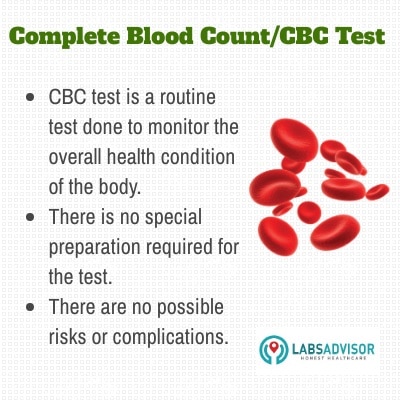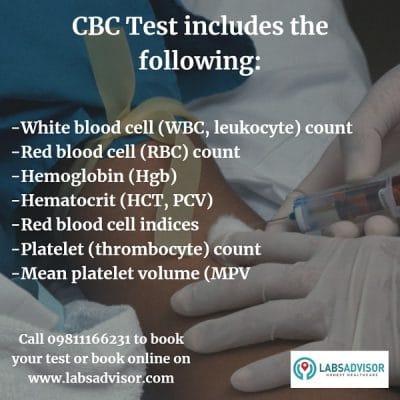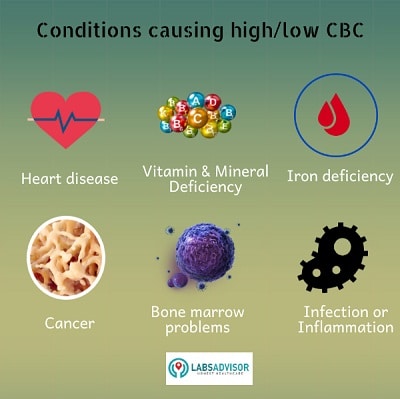
Complete Blood Count test is the full form of the CBC test. It is done to evaluate the overall health and to screen for various disorders.
Book this really important test at your local top-quality labs through us at up to 50% discount. The lowest CBC Test price in India is ₹160 only.
CBC Test in India Through LabsAdvisor
|
Book your CBC test online to avail the exclusive offers and cashback!
Here are the simple steps to book your appointment at a discounted price.
- Click on the link given in the below table according to your preferred city.
- Choose the most suitable lab for your CBC test.
- Select your preferred date and time for your appointment.
- Enter the patient details and click submit.
- Congratulations! You have booked an appointment at a discounted price.
Book online yourself at any time of the day or night by clicking on the appropriate link.
CBC Test Price in India and Lab Details
Below is the list of CBC test price in India, please click on the link you want and you can see all the labs near you and book online.
| CBC Test Price, Labs & Book Appointment | Price Starting From |
| CBC Test Price in Delhi | ₹240 |
| CBC Test Cost in Gurgaon | ₹192 |
| CBC Test Cost in Noida | ₹162 |
| CBC Test Cost in Bangalore | ₹240 |
| CBC Test Cost in Mumbai | ₹225 |
| CBC Test Cost in Chennai | ₹255 |
| CBC Test Cost in Hyderabad | ₹170 |
| CBC Test Cost in other Indian cities | ₹160 |
What is a CBC Test?
Complete Blood Count test is the full form of the CBC test. It is done to evaluate the overall health and to screen for various disorders.
Why is a CBC Test Important?
Our body is primarily made up of cells and water and formed when many of the cells group together to form the bones, muscles, and organs, such as lungs, kidneys, heart, etc. These cells stay in one place within the body and are stationary. However, some very special and important cells move throughout the body by circulating in the blood. These “moving” cells provide oxygen to all the stationary cells in the body, help fight infection throughout the body, and help stop bleeding after an injury. Information about these cells can provide important clues about the overall health of the body.
A CBC test gives important information about these circulating cells in our blood especially red blood cells, platelets, and white blood cells. After your blood sample is collected and sent to the lab, the number of each circulating cell is then automatically counted by a lab instrument. Any increase or decrease in the cell count is determined by the CBC test. Normal values vary depending on your age and gender. Your lab report will tell you the normal value range for your age and gender.

When is a CBC Blood Test Done?
CBC test is mostly recommended by your doctor to review the overall health and also to screen the body for a variety of disorders, such as leukemia or anemia.
A complete blood count test may be done to
- Find the cause of symptoms such as weakness, fatigue, fever, weight loss or bruising
- Check for anemia
- Detect how much blood has been lost if you had a bleeding
- Check for an infection in the body
- Diagnose a few diseases of the blood, such as leukemia
- Check how the body is dealing with some types of radiation treatment or drugs
- Identify the abnormal bleeding affecting the blood cells and count
- Screen for low and high values before a surgery
- See if there are too many or a few certain types of cells. This can also help to find other conditions, such as too many eosinophils may mean an allergy or asthma is present.
What are the Parameters Covered?
A CBC test usually includes
- White blood cell (WBC, leukocyte) count
- White blood cell types (WBC) differential
- Red blood cell (RBC) count
- Hemoglobin (Hgb)
- Hematocrit (HCT, packed cell volume, PCV)
- Red blood cell indices
- Platelet (thrombocyte) count
- Mean platelet volume (MPV)

Details of these parameters are given below.
- White Blood Cell (WBC, Leukocyte) count:
Our body is protected by the white blood cells (sometimes referred to as leukocytes) against infection. If an infection develops, the white blood cells destroy the bacteria, viruses, or other organisms causing it. WBC is formed in the bone marrow and they enter the blood for migration to key organs; such as the spleen or lymph nodes. They are bigger than red blood cells but are fewer in number. When the number of white cells rises very quickly, it indicates an infection in the body.
- White Blood Cell Types (WBC differential):
The major types of white blood cells are lymphocytes, monocytes, neutrophils, basophils, and eosinophils. All these cells play a different role in protecting the human body. The different numbers of each one of these types of white blood cells give important information about the immune system. The increase or decrease of these different types of white blood cells can help us detect an infection in the body, an allergic reaction to chemicals or medicines, and many other conditions, such as leukemia, immune disorders, etc.
- Red Blood Cell Indices:
Red blood cell (RBC) indices are part of the CBC test. There are three red blood cell indices:
1) Mean Corpuscular Hemoglobin (MCH), it is the content of Hb present in the average red blood cell.
2) MCV (Mean Corpuscular Volume) is the average volume of the red blood cell.
3) Mean Corpuscular Hemoglobin Concentration (MCHC) is the average amount of hemoglobin present in the given volume of hematocrit. It measures the shape, size and physical characteristics of the RBCs.
RBC indices can be used to help the doctor diagnose the cause of anemia. A blood disorder in which you have too few red blood cells is known as anemia.
- Hemoglobin (Hb):
Hemoglobin (Hb or Hgb) is an iron-rich protein that carries oxygen to the body and gives the blood cell its red color. This test measures the blood’s ability to carry oxygen all over the body and also measures the amount of hemoglobin in the blood. If your hemoglobin level is lower than normal, it means you have a low red blood cell count (anemia). However, the hemoglobin levels can be low even when the RBC count (i.e. number of RBCs) is within the reference range. So a CBC test report includes the amount of hemoglobin, the number of RBCs, and other measurements related to the RBCs.
- Red Blood Cell (RBC) count:
Red blood cells play a very important role in carrying oxygen from the lungs to the rest of the body. RBC also carries carbon dioxide back to the lungs so it can be exhaled. The body may not be getting the oxygen it needs if the RBC count is low (anemia). All the red blood cells will clump together and block tiny blood vessels (capillaries) if the count of RBC is too high (a condition called polycythemia or heart disease). Oxygen is required for all the stationary cells to function; thus, they are dependent on the RBCs to transport it.
- Hematocrit (also known as PCV – Packed Cell Volume):
This is a simple blood test that determines the percentage of red blood cells (RBCs) in the blood. Oxygen is carried throughout the body by the red blood cells. Having too many or too few red blood cells in your body can be a sign of certain diseases. This PCV test indicates the percentage of blood by volume that is composed of red blood cells.
- Platelet (Thrombocyte) count:
Platelets are the smallest blood cells that help our body to stop bleeding by clotting. When bleeding occurs in our body, it sends out signals that are picked up by the platelets and then they rush to the bleeding site and it forms a sticky plug or blood clot that helps stop the bleeding. Uncontrolled bleeding may be a problem if there are too few platelets. But if your body has too many platelets, there is a chance of a blood clot forming in a blood vessel. The platelets also may be involved in the hardening of the arteries. Platelets are made in the bone marrow along with the Red and White blood cells.
- Mean Platelet Volume (MPV):
Mean platelet volume identifies the average size and volume of platelets found in the blood. This test is used along with platelet count to diagnose some diseases. Sometimes even if the platelet count is normal, the mean platelet volume can still be too high or too low.
How is a CBC Test Performed?
For a complete blood count test, a phlebotomist will take a sample of your blood by inserting a needle into a vein in your arm, usually at the bend in your elbow. If this blood test is done on an infant, the phlebotomist will use a heel stick instead of a blood draw from a vein.
The blood sample is then sent to the lab for analysis. You can return to your usual activities immediately. There are no risks or complications in this procedure. It takes less than 5 minutes to perform this test.
Is there any Preparation Required for the Test?
No, there is no special preparation required. You can eat and drink normally before the test if your blood sample is being tested only for a complete blood count. You may need to fast for a certain amount of time before the test if your blood sample will also be used for some other additional tests. Your doctor will give you specific instructions.
What Does the Test Result Mean?
The normal reference range of the blood cells in men and women is summarized in the table below.
| Blood component | Normal range in men | Normal range in women |
| Red blood cell | 4.32 – 5.72 million cells/mcL | 3.90 – 5.03 million cells/mcL |
| Hemoglobin | 135 – 175 grams/L | 120 – 155 grams/L |
| Hematocrit | 38.8% – 50% | 34.9% – 44.5% |
| White blood cell | 3500 – 10500 cells/mcL | 3500 – 10500 cells/mcL |
| Platelet count | 150000 – 450000/mcl | 150000 – 450000/mcL |
In addition to the reference range, the doctor will also consider many other factors while interpreting the CBC test results. These factors also include your family and personal medical history. Also, there are other factors that might cause an incorrect test result such as improper sample collection or handling. Therefore, it’s important to discuss the results with your concerned doctor.
The causes of increased and decreased levels of blood cells are given below:
Red Blood Cells (RBC)
- Increased (known as polycythemia): High values of RBC can be caused by exposure to carbon monoxide, kidney disease, long-term lung disease, smoking, some cancers, certain forms of heart disease, liver disease, alcoholism, a rare disorder of hemoglobin that binds oxygen tightly or a rare disorder of the bone marrow (polycythemia vera). Sometimes conditions like dehydration, diarrhea or vomiting, excessive sweating, and the use of diuretics can affect the body’s water content and it can also cause high RBC values in the body. The lack of fluid in the body makes the RBC volume look high.
- Decreased (known as anemia): Low values of RBC is caused by anemia. Anemia can be caused by colon cancer, stomach ulcers, inflammatory bowel disease, heavy menstrual bleeding, some tumors or reactions to some medicines and chemicals. A low RBC value can also be seen if a spleen has been removed from the body. A lack of vitamin B12 or folic acid can also cause anemia, such as pernicious anemia, which is a problem with absorbing vitamin B12.
White Blood Cells (WBC)
Total Leucocytes Count:
- Increased White Blood Cell (WBC, Leukocyte): High values of WBC are caused by various conditions that include inflammation, infection, damage to body tissues (such as a heart attack), severe emotional or physical stress (such as an injury or surgery, high fever), kidney disease, lupus, tuberculosis (TB), rheumatoid arthritis, leukemia, malnutrition and diseases such as cancer. High WBC values can also increase due to underactive adrenal glands, thyroid gland problems, certain medicines or steroids, or removal of the spleen.
- Decreased White Blood Cell (WBC, Leukocyte): Low values of WBC can be caused by various conditions that include reactions to medicines, chemotherapy, aplastic anemia, malaria, alcoholism, viral infections, AIDS, and lupus. The WBC count can also be lower due to a large spleen.
Differential Leucocytes Count:
Neutrophils:
Increased by:
- Gonorrhea, herpes, chickenpox, herpes and other acute bacterial infection.
- Stress response due to surgery, emotional distress, acute hemorrhage
- Inflammatory diseases such as rheumatic fever, acute gout, vasculitis, myositis
- Medications (steroids, lithium)
- Vigorous exercise
Decreased by:
- Viral infections such as hepatitis, influenza, typhoid, mumps, measles, rubella
- Medications like chemotherapy, anti‑arthritis medications
- Collagen vascular disease such as systemic lupus erythematosus
- Deficiency of folic acid or vitamin B12
- Bone marrow depression caused due to cytotoxic drugs or radiation
Eosinophils:
Increased by:
- Allergic disorders such as hay fever, asthma, food or drug sensitivity
- Parasitic infections such as hookworm, roundworm, amebiasis, trichinosis
- Various skin diseases such as dermatitis, herpes, eczema, psoriasis
- Neoplastic diseases like chronic myelocytic leukemia, Hodgkin’s disease
- Miscellaneous diseases like collagen vascular disease, pernicious anemia, ulcerative colitis, scarlet fever
- Excessive exercise
- Stress
Decreased by:
- Stress response caused due to trauma, burns, surgery, shock, mental distress
Basophils:
Increased by:
- Miscellaneous disorders such as chronic myelocytic leukemia, Hodgkin’s disease, myxedema, polycythemia vera, some chronic hemolytic anemias, ulcerative colitis, chronic hypersensitivity states, rheumatoid arthritis
Decreased by:
- Miscellaneous disorders such as hyperthyroidism, pregnancy, ovulation, stress
Lymphocytes:
Increased by:
- Viral Infections such as syphilis, hepatitis, tuberculosis, mumps
- Stress
- Chronic inflammatory disorder
- Lymphocyte leukemia (elderly) thyrotoxicosis
- Hypoadrenalism
- Ulcerative colitis
- Immune diseases
Decreased by:
- Severe debilitating illnesses such as adrenal failure, congestive heart failure, advanced tuberculosis
- Defective lymphatic circulation
- High levels of adrenal Corticosteroids
- Viral hepatitis
Monocytes:
Increased by:
- Infections such as tuberculosis, hepatitis, malaria, fungal infections
- Collagen vascular disease
- Rheumatoid arthritis
- Systemic lupus erythematosus
- Carcinomas such as monocytic leukemia, lymphomas
Decreased by:
- Not significant
Hemoglobin:
- Increased: A high hemoglobin count is somewhat different from a high red blood cell count, because each cell may not have the same amount of hemoglobin proteins.
- Decreased: A low number of RBCs leads to low levels of hemoglobin since hemoglobin is contained only in the RBCs. However, hemoglobin levels can be low if there is something wrong with the RBCs even when the RBC count (i.e. the number of RBCs) is within the reference range. So a CBC test report includes the amount of hemoglobin, the number of RBCs, and other measurements related to the RBCs.
Red Blood Indices:
MCV (Mean Corpuscular Volume)
- Increased: This Indicates RBCs are larger than normal (macrocytic). This is due to anemia caused by vitamin B12 or folate deficiency, myelodysplasia, liver disease, hypothyroidism
- Decreased: This indicates RBCs are smaller than normal (microcytic), caused by thalassemias or iron deficiency anemia.
MCH (Mean Corpuscular Haemoglobin)
- Increased: Correlate with the MCV values and usually follow the same trend.
- Decreased: Mirrors MCV results; macrocytic RBCs are large so tend to have a higher MCH.
MCHC (Mean Corpuscular Hemoglobin Concentration)
- Increased: One of the main reasons for the MCHC level to be high is because of spherocytosis. It can also be caused by having too little folic acid or vitamin B12 in the body.
- Decreased: Mirrors MCV results; small red cells would have a lower value. This indicates RBCs are smaller than normal (microcytic); caused by thalassemias or iron deficiency anemia.
Platelets:
- Increased: High platelet values may be seen with iron deficiency, bleeding, some diseases like cancer, or problems with the bone marrow, rheumatoid arthritis, infectious diseases such as tuberculosis, if an individual has had their spleen removed surgically, use of birth control pills (oral contraceptives).
- Decreased: Low platelet values can occur due to viral infections such as hepatitis, HIV or measles and also during pregnancy or idiopathic thrombocytopenic purpura (ITP) and also due to certain drugs, such as aspirin and ibuprofen, some antibiotics and other conditions that affect how platelets are made or that destroy platelets. A large spleen can also lower the platelet count.

Other topics you may be interested in:-
- Kidney Function Test Cost in India
- Thyroid Function Test Cost in India
- Liver Function Test Cost in India
- Lipid Profile Test Cost in India







If you want us to call you back, click on the link below:
Call Me Back